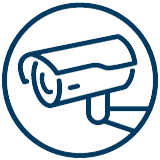|  | Know better. Do better. |  | DataveillanceAI, privacy and surveillance in a watched world |
|
| | The legislature in California is now considering two dueling facial recognition laws - one that would extend a ban on police use of the technology for another decade, and another that would allow it under certain conditions.
A three-year ban on police use of facial recognition technology expired in January, and a coalition of groups - including the American Civil Liberties Union - are supporting AB 1034, a bill that would extend it another decade.
Law enforcement and industry groups have been pushing to weaken restrictions on police usage of facial recognition technology across the country, Reuters reported last year.
They support AB 642, a law that would allow police to deploy facial recognition technology with certain limits - including a restriction on using a facial recognition match as the "sole" justification behind an arrest.
The bill advanced out of the public safety committee on Tuesday.  A facial recognition camera is shown pointed at the entrance of a Rite Aid store in downtown Los Angeles, California, U.S., October 16, 2019. REUTERS/Mike Blake |
Critics of the bill point out that technology has been shown to be less accurate with racial minority groups.
In a number of high-profile instances, police in multiple U.S. states have arrested innocent Black men who were incorrectly flagged by facial recognition tools.
The technology is "simply too dangerous and corrosive to our rights to be used by law enforcement," the ACLU and allied groups wrote to the California legislature earlier this month. |
Rest of the world: what’s new?Asia
Vidhi Doshi, India correspondent
India has introduced draconian new rules that give its government sweeping powers to censor and silence online critics through a government-appointed "fact-checking unit" that will identify and remove designated "fake news" on social media platforms.
The Editors Guild of India said the move would damage press freedom in the country, and that India's government has in effect given itself absolute power to determine what is fake and not.
We recently reported on freedom of speech in India - including the government creating an army of cyber volunteers to identify, troll and silence its online critics.  People walk beneath a surveillance camera in the Kings Cross area in London, Britain, August 14, 2019. REUTERS/Hannah McKay |
Europe
Adam Smith, UK tech correspondent
British police are preparing to reintroduce facial recognition technology after a new report from the National Physical Laboratory found it had become more accurate.
The NPL said there are no statistically significant deviations across gender and ethnic lines, but campaigners are still concerned by use of the technology.
The chances of a false positive - where someone is detected by facial recondition despite not being in the police database - are 1 in 6,000, which Madeleine Stone of Big Brother Watch says is too high considering the number of faces that will be picked up by this technology.
Africa
Kim Harrisberg, South Africa correspondent
Peer-to-peer bitcoin platform Paxful, with some 45% of its users based in Africa, announced its shutdown last week. Its 1.5 million Nigerian users, who make up Paxful's biggest market, are feeling the effects.
Co-founder Ray Youssef cited key staff departures and regulatory challenges as the reasoning behind the closure.
Nigeria ranks 9th on a global crypto ownership and use index out of 154 countries analysed by research firm Chainalysis, despite an official crackdown on crypto trading in the country.  Migrants, mostly from Venezuela seeking asylum in the U.S., use their phones to access the U.S. Customs and Border Protection CBP ONE application, in a shelter near the border between Mexico and the United States, in Ciudad Juarez, Mexico February 24, 2023. REUTERS/Jose Luis Gonzalez |
Latin America
Diana Baptista, Mexico correspondent
Criticism is mounting against CBP One, a U.S. government app released in January for migrants on Mexico's northern border to request an asylum appointment.
Human rights advocates say the app requires a strong WiFi connection and newer smartphones to work, furthering the digital divide among vulnerable asylum-seekers. There are also reports that the app's photo capture function fails to identify darker skin tones.
The persistent app glitches prevent migrants from securing an asylum appointment, which has separated dozens of families at the border, activists say. |
|
|
| | As tech experts raise concerns over the risks of artificial intelligence, the EU is inching closer to making the world's first extensive AI rules | Rising costs are making it harder for vulnerable groups - from children to the elderly - to access tech and online services | Finding ways to redirect investment to sustainable forest businesses could protect Brazil's Amazon - and cut inequality | A pumped hydro storage project in Manipur state is the first in India to power the tech with solar pumps | What does ChatGPT mean for Africa’s digital transformation? | |
| |
| | | |
|